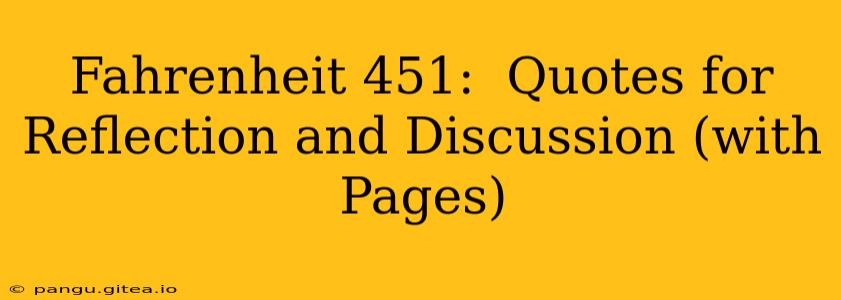Ray Bradbury's Fahrenheit 451 is a dystopian masterpiece that continues to resonate with readers decades after its publication. Its exploration of censorship, conformity, and the power of knowledge remains strikingly relevant in our increasingly digital world. This post delves into some of the most thought-provoking quotes from the novel, providing context and prompting reflection for deeper understanding and discussion.
Key Quotes and Their Significance
Bradbury's prose is rich with imagery and symbolism, making even seemingly simple sentences deeply impactful. Let's examine some of the most important quotes and their contextual significance within the narrative:
1. "It was a pleasure to burn." (Page 1)
This opening line immediately establishes the unsettling normalcy of destruction in Montag's world. Burning books isn't viewed as an act of violence or censorship, but rather a routine task, a source of perverse pleasure. This chilling introduction sets the stage for the novel's exploration of societal complacency and the dangers of unchecked power.
2. "We're not allowed to think. We're only allowed to react." (Page 59)
This quote perfectly encapsulates the oppressive nature of Montag's society. Critical thinking is actively discouraged, replaced by a constant stream of superficial entertainment designed to keep the population passive and unquestioning. This highlights the fragility of intellectual freedom and the ease with which it can be eroded.
**3. "A book is a loaded gun in the house next door." (Page 14) **
This potent metaphor illustrates the dangerous potential of knowledge and the fear it inspires in those who seek to maintain control. Books, repositories of diverse perspectives and challenging ideas, are perceived as threats to the established order. This speaks to the ongoing tension between freedom of information and attempts at suppression.
4. "If you don't want a man unhappy politically, don't give him two sides to a question to worry him; give him one. Better yet, give him none." (Page 58)
This quote exposes the manipulative nature of the ruling power. By controlling the information available to citizens, they can control their thoughts and prevent dissent. This highlights the deliberate suppression of opposing viewpoints and the cultivation of a singular, unquestioned narrative.
5. "I'm afraid of what I'm becoming..." (Page 162)
This quote, spoken by Montag, reveals his burgeoning self-awareness and growing discomfort with his role in society. His transformation from book burner to intellectual rebel begins with a questioning of his own actions and their consequences. This marks a pivotal moment in his journey towards enlightenment and rebellion.
Frequently Asked Questions (FAQs)
Here are some frequently asked questions about Fahrenheit 451 and its themes, addressed using quotes and insights from the novel:
What is the significance of the title, Fahrenheit 451?
The title, Fahrenheit 451, refers to the temperature at which book paper ignites and burns. This literal meaning underscores the novel's central theme: the destruction of knowledge and the silencing of dissenting voices. The number itself represents the systematic eradication of information.
How does Bradbury use symbolism in Fahrenheit 451?
Bradbury masterfully employs symbolism throughout the novel. Fire, initially representing destruction and conformity, later symbolizes both destruction and the potential for enlightenment. The mechanical hound represents the ever-watchful state surveillance, while the characters themselves represent various aspects of societal reaction to the control of information.
What is the role of technology in Bradbury's dystopia?
Technology in Fahrenheit 451 serves as a tool of control and distraction. The constant stream of television programming, the pervasive surveillance, and the sophisticated technology used to suppress dissent all contribute to the oppressive atmosphere. Technology is not inherently evil, but in the wrong hands, it can be used to restrict freedom.
What is the importance of the interactions between Montag and Clarisse McClellan?
Clarisse’s innocence and inquisitive nature act as a catalyst for Montag’s awakening. Her questions challenge his preconceived notions and prompt him to question the society he's always taken for granted. Her influence represents the power of curiosity and independent thought in breaking down the conformity.
What is the meaning of the ending of Fahrenheit 451?
The ambiguous ending of Fahrenheit 451 leaves the reader with a sense of hope and uncertainty. Montag's escape and his connection with the book-loving hobos symbolize the enduring power of human resilience and the potential for knowledge to survive even in the face of oppression. The uncertain future underlines the ongoing battle against censorship and the ongoing fight for intellectual freedom.
By carefully considering these quotes and exploring their deeper meanings, readers can engage more fully with the enduring themes of Fahrenheit 451 and its lasting relevance. Bradbury's work challenges us to reflect on our own societies and the importance of protecting knowledge, critical thinking, and intellectual freedom.
